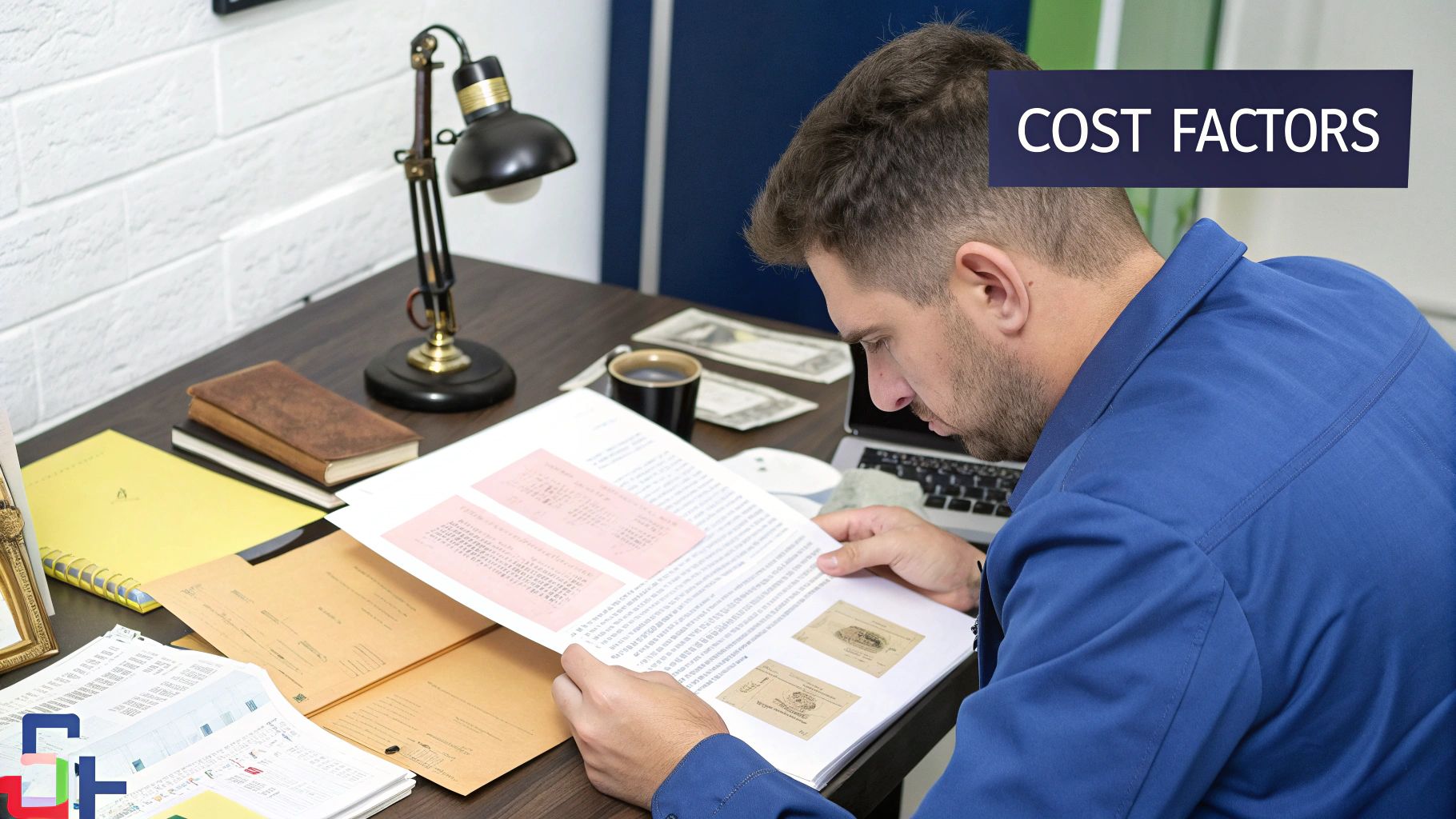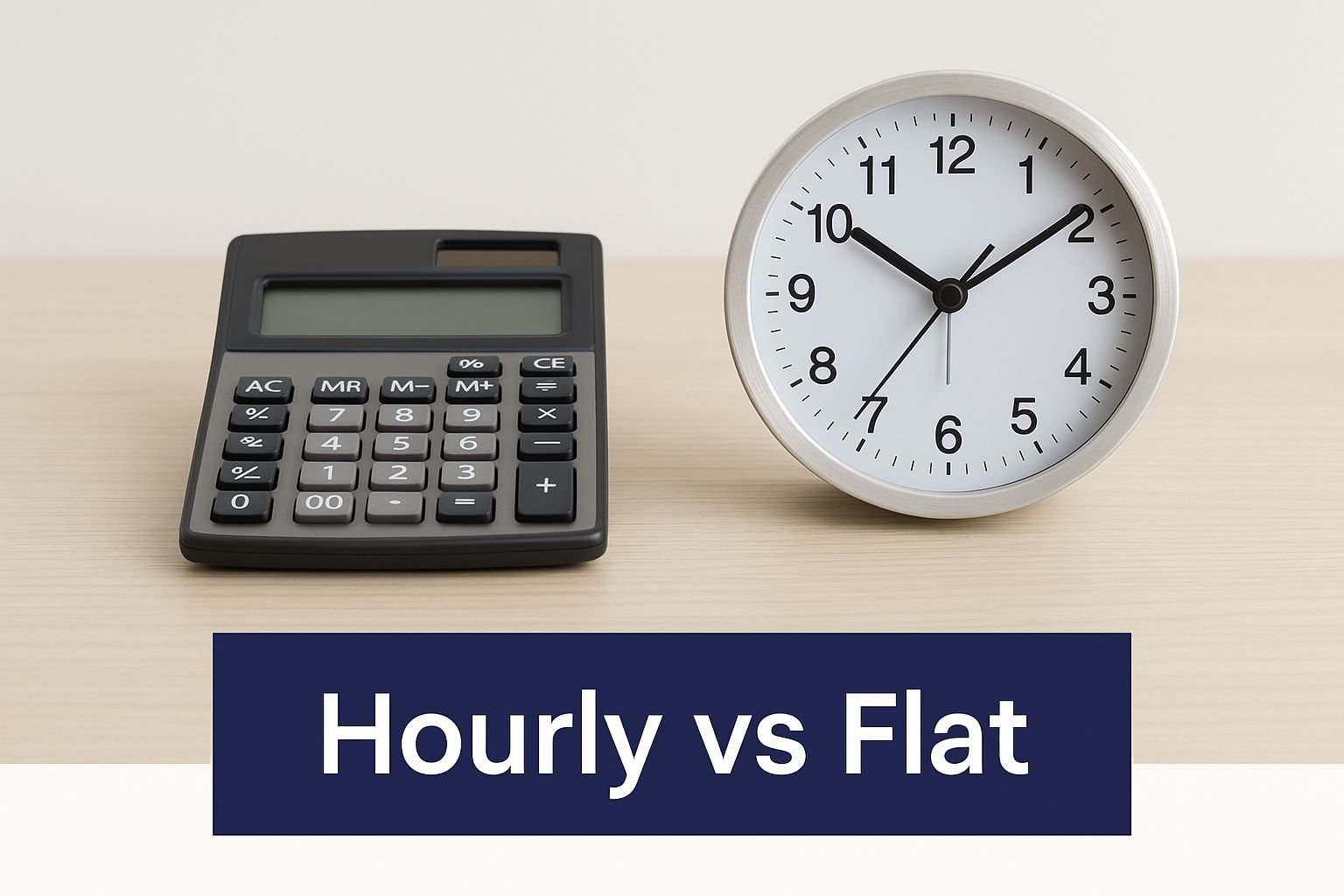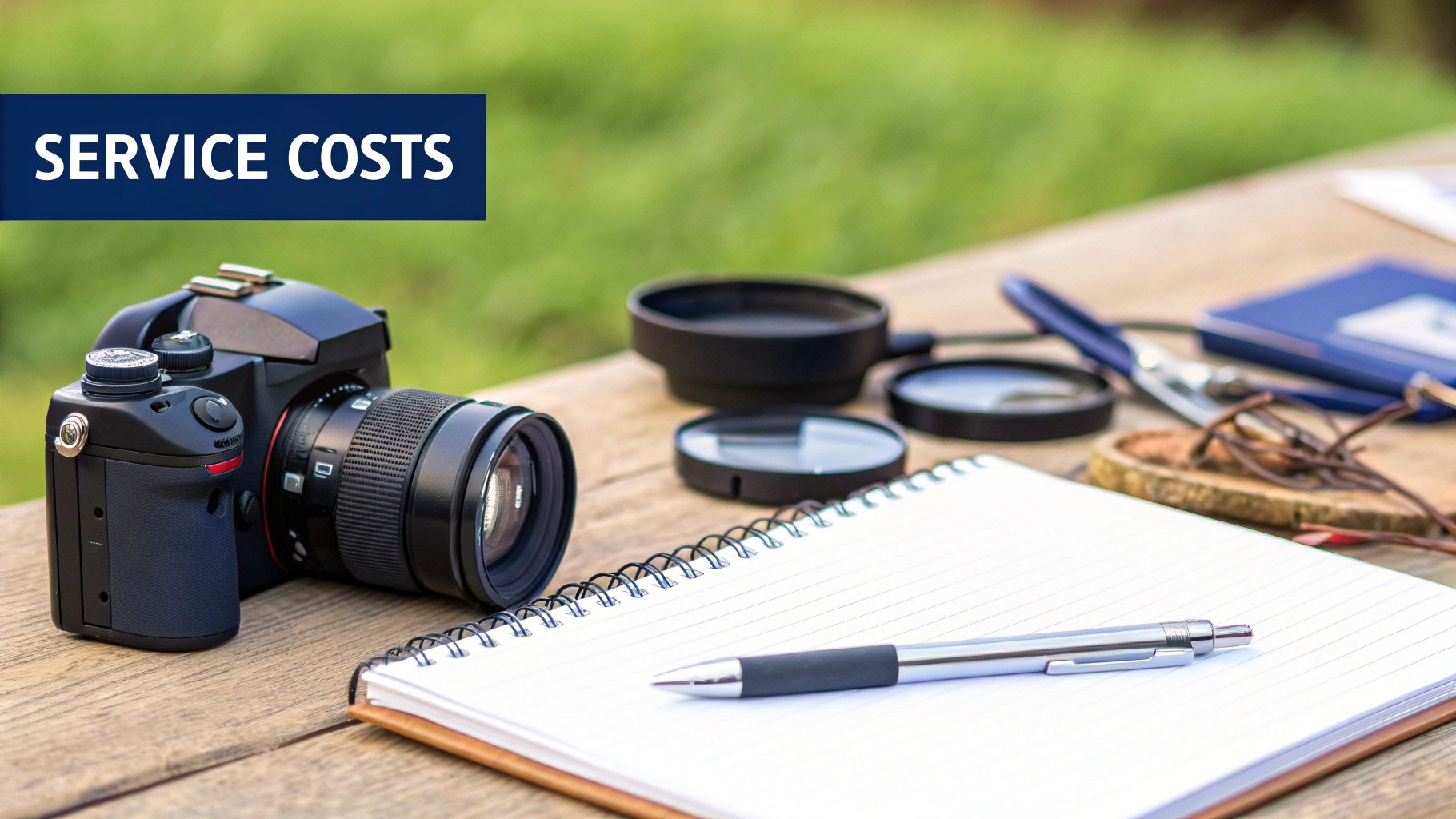How Much Do Private Investigators Charge? Get the Facts
- Showix technical Team
- Jul 20, 2025
- 10 min read
Updated: Jul 28, 2025
So, you're wondering how much it costs to hire a private investigator? It's a fair question, and the answer isn't always straightforward. As a starting point, you can generally expect an hourly rate in the UK to be around £50 to £75. However, that's just a ballpark figure. For more clear-cut tasks, like a basic background check, an investigator might quote you a fixed price instead.
Understanding the Real Cost of Hiring a Private Investigator

The first thing to get your head around is that pricing isn't a one-size-fits-all deal. Think of it less like buying something off the shelf and more like commissioning a bespoke piece of furniture. The final bill really depends on what you need and how complicated the job is.
For example, trying to find a missing person is a completely different kettle of fish to carrying out surveillance on a partner you suspect of cheating. Each case has its own unique challenges and requires a different level of resources, which naturally affects the cost.
A professional investigator provides a custom service, and the price reflects the skill, time, and tools needed to get you answers—discreetly and legally.
Across the industry, the average hourly rate for a private investigator in the UK sits comfortably between £50 and £75. You might see simpler desk-based jobs quoted lower, perhaps around £30 per hour, but that’s not as common. Many agencies also offer package deals for specific services, which could be anything from £150 to over £1,500, depending on what's involved. For a deeper dive, you can explore a detailed UK price guide for more specifics.
To give you a better idea of what to expect, let's look at some common services and their typical costs.
Private Investigator Services and Typical UK Costs
The table below breaks down some of the most requested services and gives you a rough idea of their pricing structure and potential cost. This should help you see how different types of work are billed.
Service Type | Typical Pricing Model | Estimated Cost Range (£) |
|---|---|---|
Surveillance | Hourly Rate + Expenses | £50 - £95 per hour |
Background Check | Flat Fee | £150 - £600+ |
People Tracing | Flat Fee | £100 - £500 |
Bug Sweep (TSCM) | Per Square Foot / Flat Fee | £500 - £2,500+ |
As you can see, the costs vary quite a bit. A quick person-tracing task is far less involved than a comprehensive technical bug sweep, and the pricing reflects that difference in complexity and time.
Making Sense of PI Pricing Models
Figuring out how a private investigator charges can feel a bit murky at first, but it almost always boils down to one of three common approaches. Once you get your head around these, you can work out which model makes the most sense for your situation and what the final bill is likely to look like.
The most common way PIs bill is by the hourly rate. Think of it just like a 'pay-as-you-go' mobile plan. It’s perfect for jobs where you can't predict how long it will take, like a surveillance operation. The investigator simply logs their time, and you pay for the hours they put in, plus any expenses you've agreed on beforehand.
Hourly Rates, Flat Fees, and Retainers
For tasks with a clear start and finish, you'll often see a flat fee. This is more like ordering from a set menu; you know exactly what you're getting and exactly what it will cost. This structure is ideal for straightforward jobs like a basic background check or finding someone at a specific address, making it easy to budget for.
Finally, for bigger, more tangled cases, an investigator will likely ask for a retainer. This is essentially an upfront deposit. You pay a lump sum into a client account, and the PI draws down their hourly fees and costs from that pot as the work gets done.
A retainer is really about commitment and momentum. It ensures the investigator has funds ready to go for immediate action and to cover initial costs without hitting pause, which can be absolutely vital when time is of the essence.
This image neatly lays out the key differences between the most common pricing models.

As you can see, a flat fee gives you certainty for a defined piece of work, whereas an hourly rate provides the flexibility needed when a case could take unexpected turns.
Here in the UK, you can expect an hourly rate to fall somewhere between £50 and £150, largely depending on how complex the case is and where in the country you are. For set-price jobs like background checks, the cost could be anywhere from £150 to £1,500. For more involved investigations requiring a retainer, you might see starting figures from £1,000 to over £4,000.
When you're shopping around, it helps to understand how different services are paid for. Looking at different 'pay as you go models' in other industries can give you a better feel for how these things work. To really dig into what’s behind the numbers, have a look at our detailed guide on the key factors influencing private investigator costs in 2025.
What Factors Drive Up Investigation Costs?

So, why can’t you get a single, straight answer to the question, "how much does a private investigator cost?" It's a fair question, but the truth is, no two cases are ever the same. Several key factors can dramatically affect the final price.
Think of it like getting a quote from a builder. A simple garden wall has a very different price tag to a two-storey extension with custom fittings. The same logic applies here; the cost is built around the specific job at hand.
The single biggest driver is the complexity of the case. A simple, desk-based address trace to find one person is a fairly routine task with a predictable cost. On the other hand, a deep-dive corporate fraud investigation might demand weeks of surveillance, specialist forensic accountants, and several investigators working together. Naturally, that's going to cost a lot more.
Key Cost Influencers in an Investigation
The nature of the work directly impacts the resources we need to deploy. Certain elements will almost always increase the final bill, but these aren't 'hidden fees'. They are simply the necessary tools and expertise required to get the job done right.
Here are some of the most common things that can influence the cost:
The Level of Risk: High-stakes jobs, like surveillance in a rough neighbourhood or dealing with potentially volatile individuals, demand more experienced investigators and meticulous planning. This expertise and caution are reflected in the price.
Number of Investigators Needed: For a straightforward surveillance task, one PI might be enough. But if the person you're tracking is highly aware or moves between multiple locations, you’ll likely need a team of two or more just to maintain cover and not lose them.
Location, Location, Location: Costs can vary wildly depending on where the investigation takes place. An operation in central London, with its congestion charges and higher travel expenses, will always be pricier than one in a quiet rural town.
Specialist Equipment: Sometimes, a case calls for more than just a keen eye. If we need to use things like powerful long-range camera lenses, covert recording devices, or GPS vehicle trackers, the cost of using this advanced kit will be factored into the quote.
Ultimately, the price of an investigation is a direct reflection of the time, skill, risk, and resources required to achieve your objective. A more complex puzzle simply takes more effort to solve.
Understanding Extra Expenses and Hidden Fees
When you first get a quote from a private investigator, it’s easy to think that’s the final number. But that initial figure is usually just the starting point. It's a common oversight, but the final invoice will almost always include other costs that crop up during the investigation.
This isn't some sneaky tactic to get more money out of you. It's simply the reality of investigative work. These extra expenses, often called 'incidentals', are the practical costs your investigator has to cover to get the job done properly. They’re not hidden fees, but variable costs that are impossible to predict with 100% accuracy from the outset.
Any good investigator will be upfront about these potential extra costs right from the beginning. The aim is to avoid any nasty surprises down the line, helping you budget properly and ensuring you both have a transparent, trusting relationship.
What Are These Common Extra Costs?
So, what exactly are these incidentals? Think of them as the operational costs needed to keep the investigation moving. Without them, the work could easily stall.
Here’s a breakdown of what you can typically expect to see itemised on your bill:
Mileage: If your investigator is using their own car for surveillance or to travel for your case, you'll usually see a charge per mile. This is standard practice.
Travel Fares: Sometimes, driving isn't the best option. The cost of train tickets or bus fares will be included if that's the most practical way to follow someone.
Parking Fees: This one can add up, especially in busy city centres. If your investigator is on a long surveillance job, parking is often a necessary and significant expense.
Entry Costs: If the person being observed goes into a bar, a theatre, or a ticketed event, the investigator may need to follow them inside to maintain contact. The price of that ticket or entry fee will be passed on.
These extras often include travel expenses, which can be around 45p per mile, plus other essentials like public transport or entry fees. So, the real answer to "how much do private investigators charge?" is that it truly depends on the specific demands of your case.
How to Plan Your Investigation Budget
Hiring a private investigator is a big decision, and getting your finances in order beforehand is key to making sure it's money well spent. When you approach it with a clear strategy, you’re not just controlling costs; you're setting the investigation up for success right from the start.
Thinking about what you can realistically afford before you even pick up the phone is a game-changer. It means you can work with your investigator as a team, guiding the process towards a clear goal without letting the bill get out of hand. You stay in control of both the finances and the direction of the inquiry.
Preparing for Your First Consultation
The single best way to save money and get an accurate quote? Be prepared. Before you speak to a professional, sit down and write out everything you know in a detailed brief. The more information you can give them upfront, the more efficiently they can work, which directly saves you money on their hourly rate.
For instance, just saying "I think my partner is cheating" is a bit vague. It’s far more helpful to provide specifics—like the exact times they become unreachable, the pubs or cafes they often visit, or the names of people you find suspicious. This gives the investigator a solid foundation to build on. For more tips on this crucial first step, take a look at our complete guide to hiring a private investigator in the UK.
Analysing the Quote and Setting Goals
When you receive a quote, make sure it’s fully itemised. Don't just glance at the final figure; dig into the details to understand exactly what you're paying for. You need absolute clarity on:
Hourly Rates vs. Flat Fees: Make sure you know which billing model is being used.
Retainer Details: If a retainer is needed, ask how it will be spent and what happens to any leftover funds.
Potential Expenses: The quote should give you an idea of likely extras, such as mileage, parking, or train fares.
Your most powerful tool for controlling the budget is setting clear, achievable goals. Define exactly what information you need to find out. This simple act prevents "scope creep"—where an investigation drifts off-piste and becomes broader than necessary—keeping the work focused and the costs predictable. Always discuss payment schedules and agree on a firm budget cap to avoid any nasty surprises down the line.
Frequently Asked Questions About PI Costs
When you're thinking about hiring a private investigator, one of the first things on your mind is naturally the cost. It’s a bit of a mystery for most people. To help clear things up, I’ve put together answers to some of the most common questions we get asked.
Getting a handle on the finances from the start is crucial, so let's break it down.
Is It Cheaper to Hire a Freelance PI or an Agency?
Sometimes, yes, but it’s not quite that simple. A freelancer often has lower overheads, which means they can sometimes offer a lower hourly rate. For a straightforward, local job that only needs one person, this can be a very sensible, cost-effective choice.
But for more complicated situations, an agency brings a lot more to the table. We’re talking more resources, specialised gear, and a whole team of investigators with different skills. If a case needs a couple of people doing surveillance at the same time, or requires a very specific type of expertise, an agency’s combined strength can actually get the job done more efficiently, which might save you money in the long run. The "cheapest" option really comes down to what your specific case needs.
Do I Have to Pay the Full Amount Upfront?
That all depends on how the job is priced. It's very rare to pay for everything at the very end, as the investigator has ongoing costs to cover while they're working for you.
For flat-fee services, like a simple background check, paying the full amount before the work starts is pretty standard.
For hourly or retainer-based work, you’ll almost always pay a deposit first. This retainer is like a credit you put down, which the PI bills their time against.
Any professional will make sure the payment schedule is laid out clearly in the contract before a single minute of work is done.
A professional investigator will never start work without a clear, written agreement that outlines all costs and payment terms. This protects both you and them, ensuring complete transparency from the outset.
Can I Set a Budget Cap for My Investigation?
Absolutely. In fact, I’d strongly recommend it. Agreeing on a budget limit with your investigator right at the start is one of the smartest things you can do. It keeps you in control of the costs.
A reputable PI will always respect the budget you set. If it looks like they’ll need more time or resources to get you the answers you need, they have a professional duty to tell you before they go over the limit. This puts the ball back in your court, allowing you to decide whether to increase the budget or stop the investigation. No nasty surprises, no unexpected bills.
If you need discreet, professional help to get the answers you deserve, the team at Sentry Private Investigators Ltd is here to support you. We provide clear, upfront cost structures for all our services, ensuring you have complete peace of mind. Find out how we can help by visiting us at https://www.sentryprivateinvestigators.co.uk.





Comments